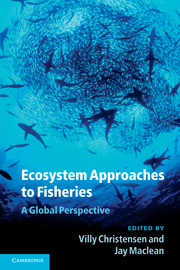Book contents
- Frontmatter
- Contents
- List of contributors
- Foreword
- Preface
- Acknowledgments
- 1 Introduction: toward ecosystem-based management of fisheries
- I Life in the oceans
- II Evaluating impact on marine life
- III Managing living resources
- IV The human side
- 13 Science and capacity building for sustainable development in fisheries
- 14 Thinking big on small-scale fisheries
- 15 Coastal-marine resource use in human ecological context: the scale and modes of integration
- 16 Global fisheries economic analysis
- V Impacting policy
- Index
- References
14 - Thinking big on small-scale fisheries
Published online by Cambridge University Press: 05 June 2012
- Frontmatter
- Contents
- List of contributors
- Foreword
- Preface
- Acknowledgments
- 1 Introduction: toward ecosystem-based management of fisheries
- I Life in the oceans
- II Evaluating impact on marine life
- III Managing living resources
- IV The human side
- 13 Science and capacity building for sustainable development in fisheries
- 14 Thinking big on small-scale fisheries
- 15 Coastal-marine resource use in human ecological context: the scale and modes of integration
- 16 Global fisheries economic analysis
- V Impacting policy
- Index
- References
Summary
INTRODUCTION
In one of his seminal papers, Daniel Pauly directed our attention to the marginality of small-scale fisheries and related this marginalization to their physical, socioeconomic, political, and cultural remoteness from urban centers (Pauly, 1997). The often remote setting of many small-scale fishing communities around the world puts them at a disadvantage for infrastructure and market support. For example, landing facilities and road systems may not be well developed, restricting direct access to markets and consequently minimizing their bargaining power. Further, when compared with large-scale industrialized fisheries, the small-scale fishing subsector generally receives far less financial support (e.g., subsidies) from government (Jacquet and Pauly, 2008; Sumaila et al., this volume). With their small income on a per caput basis and low economic status, small-scale fishers lack political power to put their concerns on the government agenda.
Is marginalization of small-scale fisheries caused by the lack of appreciation for the importance of this sector? Several studies and reports emphasize the significant contribution of small-scale fisheries to food security, sustainable livelihoods, and poverty alleviation (Kurien, 1998; Berkes et al., 2001; Béné, 2003; FAO, 2004). Small-scale fisheries have comparative advantages over industrial fisheries, including greater economic and fuel efficiency (lower capital costs and fuel consumption), better social justice (e.g., less use of catches for fish reduction), and fewer negative environmental impacts (e.g., fewer discards; FAO, 2005; Pauly, 2006). Based on the above, small-scale fisheries deserve to be at the center of fisheries research and policy discussion.
- Type
- Chapter
- Information
- Ecosystem Approaches to FisheriesA Global Perspective, pp. 226 - 240Publisher: Cambridge University PressPrint publication year: 2011
References
- 4
- Cited by



